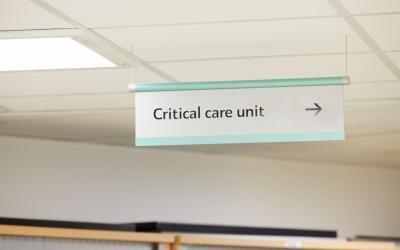Funding healthier futures: investing in the improvement of the UK’s healthcare system

Sarah Harrop takes a look at the UK healthcare landscape and what its future might hold.
How does the UK fund its healthcare system?
Here in the UK we are lucky enough to have a free-at-the-point of use, publicly funded healthcare system: the National Health Service (NHS). It is different from many healthcare systems worldwide because it is funded through taxation rather than health insurance providers – though there is a smaller private healthcare sector that people can also opt to use.
UK government funding for health services comes from the total budget for the Department of Health and Social Care (DHSC).Funding is provided mainly by taxation (around 80%), national insurance contributions and through patient charges such as dental care costs and prescriptions. Health spending in the UK as a share of the gross domestic product (GDP) has increased since 1990, when it was 5.1 percent. By 2021, healthcare expenditure in the UK amounted to 11.9 percent of the GDP. Separately, healthcare management and funding in Scotland is devolved to the Scottish Government and delivered through Scotland’s National Health Service.
What is the NHS?
Recently celebrating its 75th anniversary, the National Health Service (NHS) has grown over the decades to become a hugely complex system made up of a wide range of different organisations with different roles, responsibilities and specialisations. Together, these organisations provide services and support to patients and carers.
The NHS is available free to all UK citizens. It is there to improve the population’s health and wellbeing, support people’s physical and mental health, help people to get better when they are ill and – when they cannot fully recover – to stay as well as possible to the end of their lives. It works at the forefront of health research and medical science, bringing knowledge and skill to save lives and improve health. World-leading clinical research is led by the research arm of the NHS, the National Institute for Health Research, which funds and carries out cutting-edge clinical trials within the NHS.
The NHS is also the biggest public sector recruiter in the UK, employing 1.9 million people – from clinical staff like doctors, nurses and paramedics to administrators, managers, researchers and many more.
Each of the UK nations has its own NHS body. The NHS in England is overseen by the Department of Health, and the other bodies are NHS Scotland, NHS Wales, and NHS Northern Ireland.
These regional health services mainly differ in structure and how some of their services are delivered.
NHS England is responsible for commissioning primary care services such as doctors, dentists, and pharmacists. Since 2013, Clinical Commissioning Groups (CCG) have had the responsibility of commissioning secondary care services in local areas, which are:
- urgent and emergency patient care
- rehabilitative care
- planned hospital care
- most community health services
- mental health and learning disability services
Over the years, the NHS has changed in structure considerably and now private companies and charities are more involved in running services. All services are publicly funded and the government is ultimately accountable, but in terms of delivery, today’s NHS is more of a public-private partnership.
What are the benefits of investing in healthcare?
Investing in the health system not only saves and prolongs lives and makes people’s quality of life better, it is also a crucial investment in the wider economy. That’s because ill health is a major burden on society, hindering productivity, limiting job prospects and strangling human capital development – the cultivation of skill, experience, creativity and other positive strengths and attributes within the population.
As Stefan Kapferer, Deputy Secretary-General of the Organization for Economic Co-operation and Development (OECD) writes on the World Economic Forum’s blog, “There has been a strong political and historical commitment to treating health as a social goal, either through legislation or mandating and prioritising expenditure on health. For instance, the governments of Brazil, Costa Rica and Thailand have established social security and health insurance systems for the entire population. The key question is while it is universally accepted that health is a noble and worthwhile investment, how can we demonstrate value for money, especially in areas that compete for government funding?”
India, for example, spends very little on health compared with similar middle-income countries like South Africa and Brazil. Health services are paid for directly by Indian households and this leaves many out of pocket, which can cause financial hardship. While the Indian government are, commendably, pushing towards universal health coverage, it’s important that this offers value for money, Kapferer goes on to explain.
“OECD’s experience is that additional expenditure places pressure on scarce resources. With only so many doctors, nurses, health workers and physical facilities at a moment in time, higher spending means higher prices as well as more services.”
Some middle-income countries have addressed this challenge by defining a limited set of services that are essential and cost-effective. One example is Mexico’s Seguro Popular programme that provides a package of interventions that includes medicines.
“Effective policies can ensure that states’ incremental spending goes to health, but also enhances value for money. This is because funding can be linked to cost-effective interventions, such as preventive and primary care activities, rather than less cost-effective (but more visible, and therefore more politically attractive) interventions, such as construction of new hospitals,” concludes Kapferer.
What should governments do to improve the healthcare sector?
According to a 2020 report by McKinsey, Prioritizing health: A prescription for prosperity, even if governments use interventions that we already know about – changing behaviours, improving clean water, using vaccines and using known therapies to treat disease - we could reduce our disease burden by around 40% over the next 20 years and extend active middle age by 10 years.
The major report spanned 200 countries, looked forward two decades and analysed 52 diseases to put figures on the economic and social benefits that could be gained if governments and the private sector make good health a priority.
Jaana Remes, partner at the McKinsey Global Institute and one of the report’s authors, says: “It doesn’t have to cost a lot. With a healthier workforce and the expanded capacity of the elderly, we could see an economic return of $2 to $4 for each $1 invested in better health. So, the good news is that we have a lot of the answers to better health already—we just have to make the commitment.”
How has the development of the NHS changed and improved UK healthcare over the years?
The NHS was born 75 years ago, in 1948. This marked the first time anywhere in the world that completely free healthcare was made available free at the point of care to citizens rather than through paying fees or insurance. Under one service, it has brought together hospitals, doctors, nurses and dentists. However much has changed over the decades. Some of the changes to the healthcare it provides, as reported by the BBC, include:
More staff, with better skills: The NHS now employs 1.7m people, making it the fifth largest employer in the world. Nurses are the greatest proportion of the workforce, but there are now 10 times as many doctors working in the NHS as there were when it was set up. While this is partly down to increasing demand and advances in medicine, roles have changed too – for example nursing is now a degree-level profession and many nurses provide the complex care that was formerly the domain of doctors.
Bigger spend – and a bigger proportion of overall government spending: UK health spending has ballooned to 12 times the size as when the NHS started, even taking inflation into account. Over the past five years, the NHS budget has increased by 3.4% annually. Furthermore, UK governments over the years have had to invest more and more of their money into the health service. In 2018, 30p out of every £1 spent on services went towards health.
Charges have appeared: The early years of the NHS were difficult and in the early 1950s the government had to cut the budget to keep up with demand. As a result, charges were introduced for prescriptions, dental work and spectacles. In the NHS in England, prescriptions cost £9.65 (with many exemptions, covering children, older people and those with certain conditions). Meanwhile in while in other parts of the UK they are free, as a result of the devolved administrations making different decisions.
There are fewer beds: There are four times fewer beds than there were when the NHS was created. This is because patient stays are shorter and much more can be done in the community. While new mothers once stayed in hospital after the birth for a week or more, many women who give birth today can leave on the same day or the following one, for example.
We now have longer life expectancy: The high quality care of the NHS has had a hugely beneficial impact on the nation’s health. People now live 13 years longer than they did 70 years ago, partly thanks to better access to healthcare.
Fewer babies die: Since 1948, there’s been a dramatic drop in the number of babies that die before their first birthday. The reasons for this are that there are fewer congenital abnormalities, fewer premature births, less sudden infant death syndrome and fewer maternal complications and birth injuries. This is down to advances in medicine and - thanks to the NHS - most babies are now born in hospital with the latest medical advances close at hand, rather than at home.
How might the NHS change in the future?
Twenty-thirty, a report by the NIHR Policy Innovation and Evaluation Unit, was published in 2013 and was designed to inform the Department of Health and NHS England in their strategic policy making over the following two decades, to 2033. Bringing together some of the UK’s top healthcare managers, clinicians, academics, strategists, policymakers and other stakeholders the report envisages a series of future scenarios for the healthcare system.
The report says that a broad range of significant developments are expected in the provision of health care, some of which are already coming to the fore, ten years on. For example, we are already seeing advances in digital and communications technology, medical devices and medical technology, use of health data and in genetic research. Yet the NHS will need to seek greater efficiencies in coming years, if only to keep pace with increasing demand. While predicting the future of healthcare with any degree of certainty is fraught, the report uses scenario planning methods to develop possible and plausible futures.
It singles out two factors with significant potential influence on future models of care including if the:
- Use of new technology remains essentially incremental, or we see radical adoption of technological innovation; and
- Users of healthcare become increasingly motivated to take responsibility for their own health, exercising choice over services, or whether healthcare remains dominated by powerful suppliers, with largely passive users guided by strong professional influence.
By 2030, the report predicted there will be huge improvements in technology and more self-care in place of healthcare professionals. It is possible that we could reduce the costs of services and free up public services for the ever increasing demand on healthcare services that we face in the UK, the report foresees.
One of the scenarios it envisages is a future in which body scanners that can quickly diagnose disease will be found in your local supermarket. It might even automatically prescribe treatments and book appointments. Precision medicine will become increasingly well established. DNA profiling could identify individual risk factors while a wearable or implanted device monitors, transmits and interprets daily measurements.
“Put all these developments together and a significantly different model of healthcare begins to emerge, largely bypassing the traditional diagnostic and service mediating roles of clinicians,” suggest Imperial College Business School’s Professor James Barlow and independent management consultant Chris Evennett in an article for the Health Services Journal.
Shape the healthcare sector of tomorrow
Ready to lead change to help bring about improvements to the health systems of the future, tackling everything from cardiovascular disease to public health and sustainability to health inequalities? The MSc Healthcare Management programme at Queen Margaret University prepares its students for work in the field of healthcare management in the UK and beyond. Led by the Queen Margaret Business School (QMBS) and taught by the diverse and experienced staff within the School of Health Sciences and QMBS at QMU, this master’s degree is taught by experts in both management and health. You’ll gain critical analytical skills and some practical skills as well as the theoretical knowledge needed for professional practice within healthcare management, both public and private sector. What is more, the course is 100% online so you can study from anywhere and fit it around your life. Find out more

















The information below is required for social login
Login to your Account